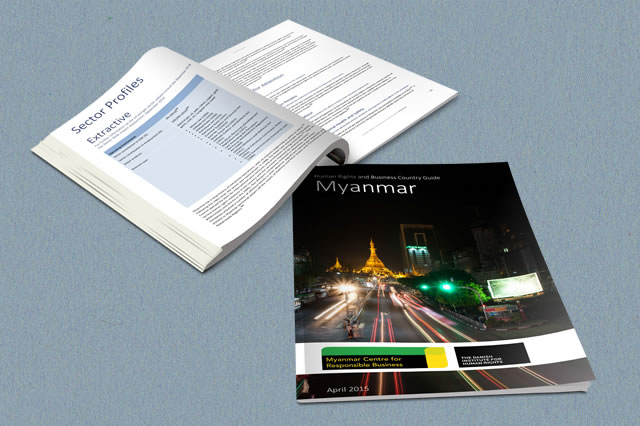Business and Human Rights Guide for Companies in Myanmar

The Myanmar Centre for Responsible Business (MCRB) and the Danish Institute for Human Rights (DIHR) today published an online “Myanmar Human Rights and Business Country Guide” concerning how businesses operating in Myanmar can impact human rights.
The guide is part of a series of Human Rights and Business Country Guides produced by the Danish Institute for Human Rights in partnership with local partners, including MCRB.
Each Country Guide covers impacts on labour rights, including child labour, forced labour, occupational health and safety, trade unions and working conditions. Also covered are impacts on community rights, including environment, land, revenue transparency and security, as well as impacts on vulnerable groups. The report provides recommendations on how to prevent and mitigate those impacts. Apart from focusing on business due diligence, the report identifies ongoing national development initiatives with which businesses can connect for ‘beyond compliance’ activities.
The Country Guide is primarily intended for local and foreign businesses operating in Myanmar that want to improve their practices and those interested in entering the country. The report is also intended to be used by government officials, international institutions, investors and civil society organisations that want to support or incentivize responsible business.
The report draws upon more than 100 local and international sources to the situation of human rights in Myanmar, and was finalized through local stakeholder consultation.
The main issues highlighted in the Myanmar report are:
-
Myanmar is experiencing significant changes to the legal environment for business, especially in areas related to labour, environment and land. There is a lack of clarity on a number of these issues, including land and child labour.
-
Trade unions were only legalized in Myanmar in 2012. The capacity to support this change, including among workers, government officials and trade unions themselves, is not yet in place. The government also needs to enforce new laws effectively so that trade union-related rights are meaningful in practice, especially regarding collective bargaining and anti-union discrimination.
-
Working conditions, especially overtime and wages, as well as health and safety, represent ongoing human rights risks for companies operating in, or sourcing from, Myanmar. The government is currently in the process of setting a minimum wage.
-
Land is an issue with major implications for human rights, development and the private sector. Most farmers lack land use certificates and traditional upland cultivation, mainly used by ethnic minority groups, is not recognised as a form of ownership. This leaves farmers vulnerable to expropriation. Companies, even if granted concessions by the government, should include investigations into the ‘legacy’ of land, and especially whether compensation was paid, in their human rights due diligence.
-
Protests are still met at times with use of force by public security forces and some protesters are detained.
-
Parts of Myanmar remain vulnerable to conflict. Although the government has negotiated peace agreements with 14 ethnic minority armed group since 2011, fighting in Kachin and northern Shan States continues.
The Country Guide gives further detail on all of these points. It provides examples of cases where businesses have adversely impacted human rights, suggests avenues for remedies, and identifies existing initiatives businesses can engage with to ensure respect of human rights and contribute to sustainable development.
NOTES FOR EDITORS
-
The Danish Institute for Human Rights works with partners in each country to gather information and build a platform for engagement. Partners conduct research and work with local stakeholders to identify business impacts and issue concrete recommendations to prevent and mitigate them.
-
Each Guide includes quantitative and qualitative information related to law, rights enjoyment in practice, and initiatives. This includes rankings, ratings and surveys from international organisations, but also information, initiatives and case studies from local organisations. Each Guide is created through a process of local information gathering and consultation. This process will be undertaken in at least 20 countries by 2016, including Brazil, Colombia, Myanmar and South Africa.
-
The Country Guide includes information on all internationally recognised human rights, and is fully aligned with the UN Guiding Principles on Business and Human Rights. The Guide also provides information beyond due diligence to ensure that companies do not simply refrain from abusing human rights, but actively contribute to development wherever they operate.
About the authors
Myanmar Centre for Responsible Business (MCRB) is a Yangon-based initiative funded by the UK, Denmark, Norway, Switzerland, Netherlands and Ireland governments, based on a collaboration between the Danish Institute for Human Rights and the UK-based Institute for Human Rights and Business. The Centre was established in 2013 to provide an effective and legitimate platform for the creation of knowledge, capacity and dialogue concerning responsible business in Myanmar, based on local needs and international standards, which results in more responsible business practices. It is a neutral platform working with businesses, civil society and government.
The Danish Institute for Human Rights (DIHR) is Denmark’s independent National Human Rights Institution established in accordance with the UN Paris Principles, with a mandate to promote and protect human rights and equal treatment in Denmark and abroad. DIHR’s Human Rights and Business Department focuses on the role of the private sector in respecting human rights. By means of research, tools and partnerships in particular with corporate stakeholders, DIHR seeks to maximise the positive impact and minimise the negative impact of business on society at large. DIHR also supports NHRIs and other State actors to play their essential role in ensuring the implementation of the UN Guiding Principles on Business and Human Rights.
 English
English မြန်မာ
မြန်မာ မြန်မာ (unicode)
မြန်မာ (unicode)








